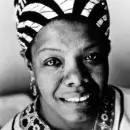
Maya Angelou
Maya Angelou, born Marguerite Johnson in St. Louis, Missouri, had a wide-ranging career as a singer, dancer, actress, and composer, and was one of the first Black women to direct a film in Hollywood. But she became most famous as a writer, editor, essayist, playwright, civil rights activist, and poet. As a civil rights activist, Angelou worked for Dr. Martin Luther King Jr. and Malcolm X. She was also an educator and served as the Reynolds Professor of American Studies at Wake Forest University (1982–2014).
She is known best for her memoir, I Know Why the Caged Bird Sings (1969, nominated for a National Book Award), which describes her early years in Long Beach, St. Louis, and Stamps, Arkansas. In one of its most evocative and controversial passages, Angelou describes how she was raped by her mother’s boyfriend when she was seven years old. When the man was murdered by her uncles for his crime, Angelou felt responsible and stopped talking, remaining mute for five years.
When Angelou, just seventeen, graduated from high school and gave birth to a son, she worked as the first African American and first female streetcar conductor in San Francisco. As she explained in Singin’ and Swingin’ and Gettin’ Merry like Christmas (1976), she also “worked as a shake dancer in night clubs, fry cook in hamburger joints, dinner cook in a Creole restaurant and once had a job in a mechanic’s shop, taking the paint off cars with my hands.” Later, she sang in San Francisco’s Purple Onion cabaret, drawing the attention of talent scouts. From 1954 to 1955, she was a cast member of a touring production of Porgy and Bess sponsored by the U.S. Department of State. During the late 1950s, Angelou sang in West Coast and Hawaiian nightclubs, before returning to New York to continue her stage career. She joined the Harlem Writers Guild in the late 1950s and met James Baldwin and other important writers.
Her use of fiction-writing techniques such as dialogue in her autobiographies was innovative for its time and helped to complicate the genre’s relationship with truth and memory. Other volumes include Gather Together in My Name (1974); The Heart of a Woman (1981), about Angelou’s acting and writing career in New York and her work for the civil rights movement; and All God’s Children Need Traveling Shoes (1986), which describes Angelou’s travels in West Africa and her decision to return to America.
Angelou was also a prolific and widely read poet. Her poetry has been praised for its depictions of Black beauty, the strength of women, and the human spirit; criticism of the Vietnam War; and demanding social justice for all. Just Give Me a Cool Drink of Water ’fore I Diiie (1971) was nominated for a Pulitzer Prize in 1972. She was the first Black woman to have a screenplay (Georgia, Georgia) produced in 1972. She was nominated for an Emmy Award for her performance in Roots in 1977. In 2013, she was the recipient of the Literarian Award, an honorary National Book Award for outstanding service to the literary community. She served on two presidential committees, for Gerald Ford in 1975 and for Jimmy Carter in 1977. In 2000, Angelou was awarded the National Medal of Arts by President Bill Clinton. In 2010, she was awarded the Presidential Medal of Freedom by President Barack Obama.